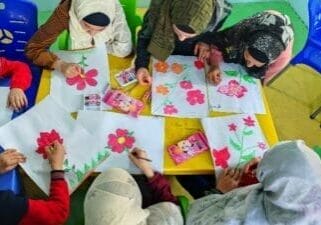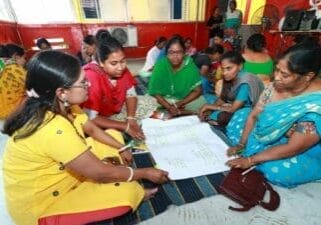News > Blog
Shifting Responsibilities of Household & Family: The Gendered Pandemic in Kenya
Published 05/10/2020 by Global Communities

by Fredrick Nyagah, Technical Specialist, Gender, Global Communities – CLEAR, funded by USAID, Cooperative Development Program – Kenya, Global Communities
“Covid-19: The Gendered Pandemic in Kenya” is a blog series that explores the many ways gender social norms effect and are effected by Covid-19. The authors discuss ways that the pandemic may challenge gender norms and how it presents opportunities for changes through the illumination of fresh perspectives. The first in the series addresses Gendered Social Distancing.
The “Stay inside” and physical distancing measures we are all experiencing around the world have meant that families are spending more uninterrupted time together than ever before.
In dual-earner homes where both partners are now teleworking and their children are now all day partners are now juggling paid labor and increased levels of unpaid care work. The family is eating meals at home more frequently and children are largely unoccupied so women’s burdens may increase just by virtue of being the individual generally responsible for those functions. Whereas men will be faced with the dilemma of how to find their place in home and child care.
Men, especially those who have previously not been engaging in care work, may find themselves at crossroads of rapid gender norms transition and needing to acquire new skills – and new attitudes. In some communities for example, it is considered unmanly for men to cook and it’s almost abominable to do it for children when the wife is present. Many Kenyan families especially in urban areas live with other relatives and in small houses. The “stay at home” situation puts them in unfamiliar environment where they confined.
Men and women have to negotiate new roles and opportunities may arise for shared roles. Some families may be experiencing both partners at home resulting in new discussions for division of labor. In this case, the husband may have new pressures to participate in house work and child care. These new negotiations may be particularly needed in families where both husband and wife are working remotely. In other scenarios – particularly relevant to healthcare workers globally, women are still required to work outside the home regularly which necessitates the uptake of labor by the male partner. Different families have different scenarios resulting in one or both parents at home or both parents working essential jobs and needing to create new arrangements for home and child care.
“I now assist my children to do their schoolwork… prepare meals for them, train them how to do their cleaning and have evening walk with them.”
These new arrangements may challenge relationships and cause debate. However, if successful, this creates an opportunity for new skills and new perspectives and could be capitalized on by communities quite literally by decreasing inequality in the home and the workplace. Research shows that that economic growth across Africa could be as high as $316 billion or 10% of GDP as a result of dedication to women’s economic equity (McKinsey, 2019).
Men may also find themselves needing to participate more actively in child care as school and caretakers may have become unavailable. “Working from home has created time for me to do what I never used to because I used to arrive home late. I now assist my children to do their schoolwork… prepare meals for them, train them how to do their cleaning and have evening walk with them. My wife really appreciates this when she arrives home in the evening from work to find everything done. I too enjoy it” said Silas, a male employee of Global Communities and father of a girl (11) and a boy (7). In Silas’ family, the new arrangement has resulted in shared roles because Silas has taken on responsibilities he previously didn’t consider to be his responsibility. He has learnt how to do so and even enjoys his new role.
As part of the response mechanisms, communities, governments and institutions should take the opportunity to promote men’s increased uptake of roles as a positive externality of the physical distancing measures invoked for Covid-19 suppression and prevention. Sharing of responsibilities should be encouraged as the norm not an exception or tokenism. Perhaps this experience will also result in reduced gender inequalities and increased respect and value of unpaid childcare and household labor, which is often undervalued and predominantly feminized.
The gender role transformational momentum, catalyzed by Covid 19, should be sustained both at the domestic and escalated to institutional levels. Never again should care work be treated as less important or a domain for women and girls. If efforts allow, disrupted gendered social norms will be one of the positive post-coronavirus lessons.





